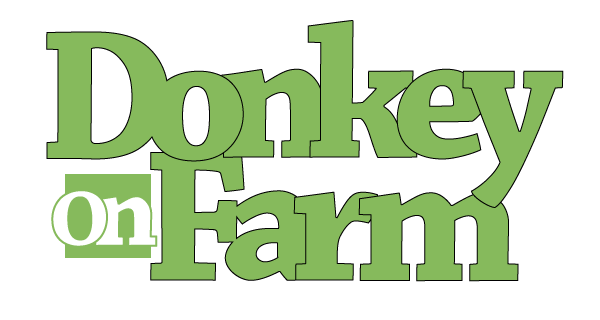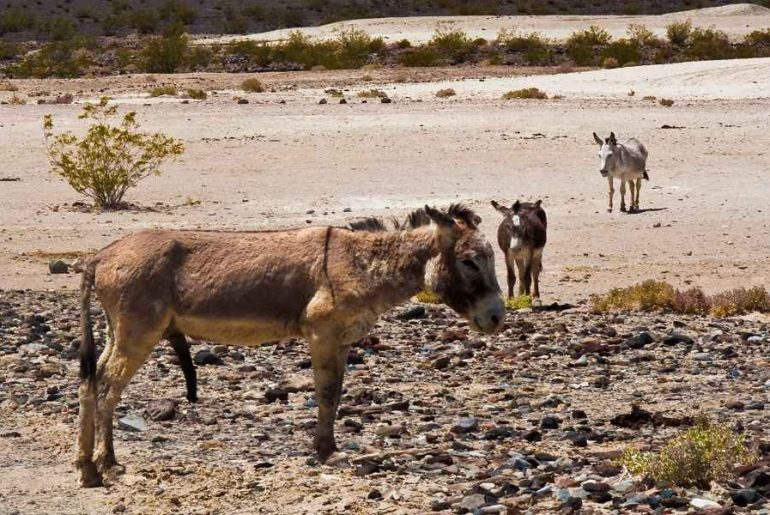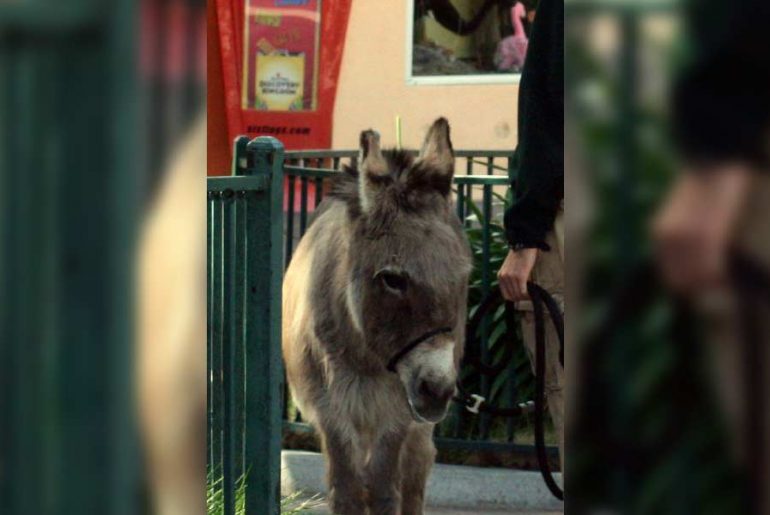Donkeys are generally animals who can tolerate hot climates. But at times, they might also suffer adversities because of the soaring temperatures. Domestic donkeys, who tend to have thicker coats, are the ones who suffer the most from this. Keeping them hydrated and letting them have access to shades are basic when it comes to keeping donkeys cool in hot weather. Read on to learn more tips on how to keep donkeys cool in hot…
Donkeys are among the animals that will not give you a hard time raising them. They tend to be low maintenance and resilient animals. Even though they are more resistant to diseases than other equines, donkeys too fall ill at times. And the top reasons that account for donkey health problems are usually related to their hooves and teeth. Read on to find out about some of the common health problems in donkeys and ways…
Miniature donkeys are known best for their adorable size which tends to range between 32-34 inches, and they weigh around 200-450 pounds. Anyone who comes across these smaller equines might have been badgered by the question of whether these fluffy little creatures can be raised as pets inside homes. The answer to this depends on the context. It is considered to be a bad idea if a person is looking to raise a miniature donkey…
Experimenting with breeding techniques has been in practice since the olden times, and mules and hinnies are the results of some of those experiments. Mules and hinnies both are the offspring of cross breeding donkeys and horses. But the factor that makes them different lies in the gender of their parents. Mules are created when a female horse is bred with a male donkey, whereas a hinny is the child of a female donkey and…
Donkeys’ gestation period spans anywhere around 11-14 months, with 12 months being an average. And during the long span of time, the expecting mothers must be taken care of properly, starting with their diet. The nutrition requirements of a pregnant jenny stay the same for up to three-quarters of the pregnancy. But the last three months is the period when the fetus undergoes drastic growth, which requires the mother to have more nutritious foods. Read…
Feeding your donkeys properly is a vital part of raising them. And if you look around, you could find a lot of options to choose from when it comes to modes of feeding them. Donkey feed bags are the most popular and convenient ones among the lot, which is also handy to use. Read on to find out about some of the best donkey feed bags available in the market. 1. Slow Hay Feeder Hay…
Picture yourself strolling through your field enjoying the light summer breeze and sunshine. But as you continue walking and get closer to the pasture, you notice more and more flies start buzzing around your head. When you get to your donkeys, you see that the flies are swarming all around them. Where did they come from, and how can you get rid of those flies on your donkey? Donkeys have a couple of natural ways…
Daily grooming sessions are a must to keep your donkey looking good. Donkeys love to roll around on the ground, and they tend to get dirty rather quickly. But should you bathe your donkey? Daily brushing is necessary to get rid of dried dirt and mud but is water and soap necessary? Donkeys don’t necessarily require full baths as long as they get groomed regularly. But, if your donkey is getting just a little too…
Donkeys are famous for kicking. There’s even an exercise inspired by and named after donkeys kicking. But why do donkeys kick? They are such cute animals, yet they seem almost ferocious when they kick so powerfully. Donkeys are adorable but fierce. There are several reasons why donkeys kick, but it all boils down to self-defense, protection of offspring, defense of territories, and establishing dominance. Kicking can also be in response to pain and even be…
Have you ever seen a donkey rolling in dry dirt? It looks like they are taking a bath in the dust. But why do donkeys roll in dust? Besides rolling for fun, donkeys have some excellent reasons for rolling in dust. And their reasons change throughout the seasons and even with temperature fluctuations throughout the day. Depending on the weather, donkeys roll in dust or dirt to fluff out their winter coat, help with shedding,…


![5 Common Health Problems in Donkeys [And Ways to Prevent Them] donkey health problems](https://donkeyonfarm.com/wp-content/uploads/2023/09/donkey-foot-problems_11zon-770x515.jpg)

![What are the Differences Between a Mule and a Hinny? [Which is Better?] difference between a mule and a hinny](https://donkeyonfarm.com/wp-content/uploads/2023/08/difference-between-a-mule-and-a-hinny-770x515.jpg)
![What to Feed a Pregnant Donkey? [Dos and Don’ts] what to feed a pregnant donkey](https://donkeyonfarm.com/wp-content/uploads/2023/08/what-to-feed-a-pregnant-donkey_11zon-770x515.jpg)
![5 Best Donkey Feed Bag Options [2023] donkey feed bags](https://donkeyonfarm.com/wp-content/uploads/2023/08/donkey_11zon-770x515.jpeg)
![How to Get Rid of Flies on Your Donkey? [Plus Prevention Methods] How to Get Rid of Flies on your Donkey](https://donkeyonfarm.com/wp-content/uploads/2022/05/How-to-Get-Rid-of-Flies-on-your-Donkey-770x515.jpg)
![Should You Bathe Your Donkey? [Plus Grooming Tips] Should You Bathe Your Donkey](https://donkeyonfarm.com/wp-content/uploads/2022/05/Should-You-Bathe-Your-Donkey-770x515.jpg)
![Why Do Donkeys Kick? [And How to Avoid Getting Kicked] Why Do Donkeys Kick](https://donkeyonfarm.com/wp-content/uploads/2022/06/Why-Do-Donkeys-Kick-770x515.jpg)
![Why Do Donkeys Roll in Dust? [It’s Not Just to Have Fun] Why do donkeys roll in dust](https://donkeyonfarm.com/wp-content/uploads/2022/05/Why-do-donkeys-roll-in-dust-770x515.jpg)